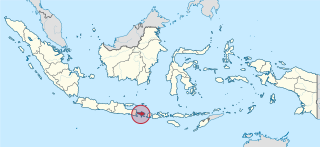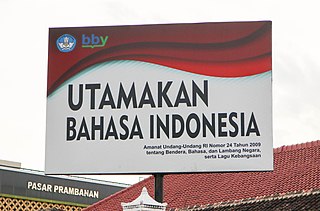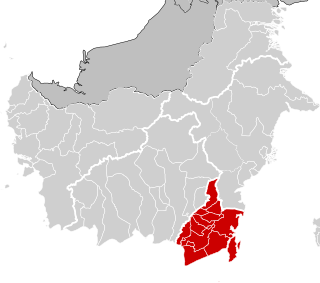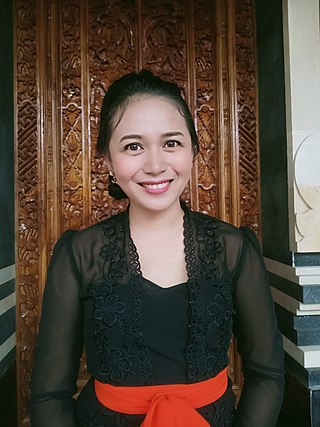
Bali is a province of Indonesia and the westernmost of the Lesser Sunda Islands. East of Java and west of Lombok, the province includes the island of Bali and a few smaller offshore islands, notably Nusa Penida, Nusa Lembongan, and Nusa Ceningan to the southeast. The provincial capital, Denpasar, is the most populous city in the Lesser Sunda Islands and the second-largest, after Makassar, in Eastern Indonesia. The upland town of Ubud in Greater Denpasar is considered Bali's cultural centre. The province is Indonesia's main tourist destination, with a significant rise in tourism since the 1980s. Tourism-related business makes up 80% of its economy.

Balinese is a Malayo-Polynesian language spoken by 3.3 million people on the Indonesian island of Bali, as well as Northern Nusa Penida, Western Lombok, Eastern Java, Southern Sumatra, and Sulawesi. Most Balinese speakers also know Indonesian. The Bali Cultural Agency estimated in 2011 that the number of people still using the Balinese language in their daily lives on the Bali Island is under 1 million. The language has been classified as "not endangered" by Glottolog.

Banyuwangi Regency is a regency of East Java province in Indonesia. This regency also known as the sun rise of Java because it is located at the easternmost end of Java Island. The town of Banyuwangi serves as a port for ferry services between Java and Bali. The regency is surrounded by mountains and forests to the west; by sea to the east and south - is separated by the Strait of Bali from Bali. With an area of 5,782.4 km2, this regency is the largest on the island of Java. The regency is a tourist destination, and subject to ongoing development as an international tourist destination with relevant infrastructure. Banyuwangi regency has been declared a taman bumi, or national geological park (Geopark) in 2018.

The culture of Indonesia has been shaped by long interaction between original indigenous customs and multiple foreign influences. Indonesia is centrally-located along ancient trading routes between the Far East, South Asia and the Middle East, resulting in many cultural practices being strongly influenced by a multitude of religions, including Buddhism, Christianity, Confucianism, Hinduism, and Islam, all strong in the major trading cities. The result is a complex cultural mixture, often different from the original indigenous cultures.

The Osing or Using are indigenous ethnic group native to easternmost part of the Java island, Indonesia. They are the descendants of the people of the ancient Kingdom of Blambangan. The population of Osing people are approximately 400,000 which concentrated in the Banyuwangi Regency of East Java Province.

Mataram is a city and the capital of the Indonesian province of West Nusa Tenggara. The city is surrounded on all the landward sides by West Lombok Regency and lies on the western side of the island of Lombok, Indonesia. It is also the largest city of the province, and had a population of 402,843 at the 2010 Census and 429,651 at the 2020 Census; the official estimate as at mid 2022 was 434,331.

International Mother Language Day is a worldwide annual observance held on 21 February to promote awareness of linguistic and cultural diversity and to promote multilingualism. First announced by UNESCO on 17 November 1999, it was formally recognized by the United Nations General Assembly with the adoption of UN resolution 56/262 in 2002. Mother Language Day is part of a broader initiative "to promote the preservation and protection of all languages used by peoples of the world" as adopted by the UN General Assembly on 16 May 2007 in UN resolution 61/266, which also established 2008 as the International Year of Languages. The idea to celebrate International Mother Language Day was the initiative of Bangladesh i.e. Bengali Country. In Bangladesh, 21 February (1952) is the anniversary of the day when the Bengalis i.e. Pakistani Bengali Muslims of the Pakistani province of East Bengal fought for recognition of their Bengali language. It is also observed by the Indian Bengalis of the Indian states of West Bengal, Assam, Jharkhand and Tripura.
Kata Kolok, also known as Benkala Sign Language and Balinese Sign Language, is a village sign language which is indigenous to two neighbouring villages in northern Bali, Indonesia. The main village, Bengkala, has had high incidences of deafness for over seven generations. Notwithstanding the biological time depth of the recessive mutation that causes deafness, the first substantial cohort of deaf signers did not occur until five generations ago, and this event marks the emergence of Kata Kolok. The sign language has been acquired by at least five generations of deaf, native signers and features in all aspects of village life, including political, professional, educational, and religious settings.

Tabanan is one of the regencies (kabupaten) in Bali, Indonesia. Relatively underdeveloped, Tabanan Regency has an area of 839.33 km2 and had a population of 386,850 in 2000, rising to 420,913 in 2010, then 461,630 at the 2020 census; the official estimate as at mid 2022 was 469,340. Its regency seat is the town of Tabanan. One of the popular tourism attractions located in Tabanan is Tanah Lot.

More than 700 living languages are spoken in Indonesia. This figure indicates that Indonesia has about 10% of the world's languages, establishing its reputation as the second most linguistically diverse nation in the world after Papua New Guinea. Most languages belong to the Austronesian language family, while there are over 270 Papuan languages spoken in eastern Indonesia. The language most widely spoken as a native language is Javanese.

The Banjar or Banjarese is an Austronesian language predominantly spoken by the Banjarese—an indigenous ethnic group native to Banjar regions— in the southeastern Kalimantan of Indonesia. The Banjarese language is the de facto lingua franca for various indigenous community especially in South Kalimantan, as well as Central Kalimantan and East Kalimantan in general.

Balinese dance is an ancient dance tradition that is part of the religious and artistic expression among the Balinese people of Bali island, Indonesia. Balinese dance is dynamic, angular and intensely expressive. Balinese dancers express the stories of dance-drama through the bodily gestures including gestures of fingers, hands, head and eyes.

The Calung is a type of Indonesian bamboo xylophone originating from Baduy culture and commonly used in Baduy, Bantenese, Sundanese, Banyumasan, and Balinese performances. The calung (instrument) consists of multiple bamboo tubes which are struck at the base to produce a woody sound.
The UNESCO Confucius Prize for Literacy recognizes the activities of outstanding individuals, governments or governmental agencies and non-governmental organizations (NGOs) working in literacy serving rural adults and out-of-school youth, particularly women and girls. The Prize was established in 2005 through the support of the Government of the People's Republic of China in honour of the great Chinese scholar Confucius. It is part of the International Literacy Prizes, which UNESCO awards every year in recognition of excellence and inspiring experiences in the field of literacy throughout the world. The Confucius Prize offers two awards of US$20,000 each, a medal and a diploma, as well as a study visit to literacy project sites in China.
Balinese literature refers to the oral and written Balinese language literature of the people of Bali, an island in Indonesia. It is generally divided into two periods: purwa, or traditional; and anyar, or modern.

Bali Arts Festival or PKB is an annual arts festival in Bali, Indonesia that celebrates, preserves and develops Balinese art and culture. First held in 1979 it has become Indonesia's longest-running arts festival. The month-long event begins with an inaugural parade usually held on the grounds of the Bajra Sandhi Monument and continues in its main venue, Taman Werdhi Budaya Art Centre, Denpasar. Traditional Balinese artists perform daily, as do performers from other parts of Indonesia and other countries. The festival also features competitions, seminars, and exhibitions of art, handicrafts and authentic Balinese cuisine.

Balinese Wikipedia is the edition of Wikipedia in the Balinese language. The Balinese Wikipedia generally follows the basic rules of Indonesian Wikipedia. The Balinese Wikipedia has been in the project incubator Wikimedia, since the incubator page was created in 2005 until October 2019.

I Wayan Arka is an Indonesian-Balinese linguist, lecturer, scholar and researcher at Udayana University (UNUD) in Bali, Indonesia and the Australian National University (ANU) in Canberra, Australia.

Dewa Ayu Carma Citrawati is an Indonesian short story writer, Balinese literature activist, and Wikimedian. She is well known for pioneering tasks to digitize and translate ancient Balinese manuscripts which have been written on palm leaves. On 15 August 2021, she was conferred with the title Wikimedian Newcomer of the Year during the 2021 virtual Wikimania conference.

Laksmi Shari De-Neefe Suardana, simply known as Laksmi De-Neefe Suardana, is an Indonesian fashion designer, author, UNICEF activist, 2022 G20 Ambassador, co-founder of Ubud Writers and Readers Festival, model, and beauty pageant titleholder who was crowned Puteri Indonesia 2022. Suardana is the first representative from Bali to be crowned Puteri Indonesia. She represented Indonesia at Miss Universe 2022.

















